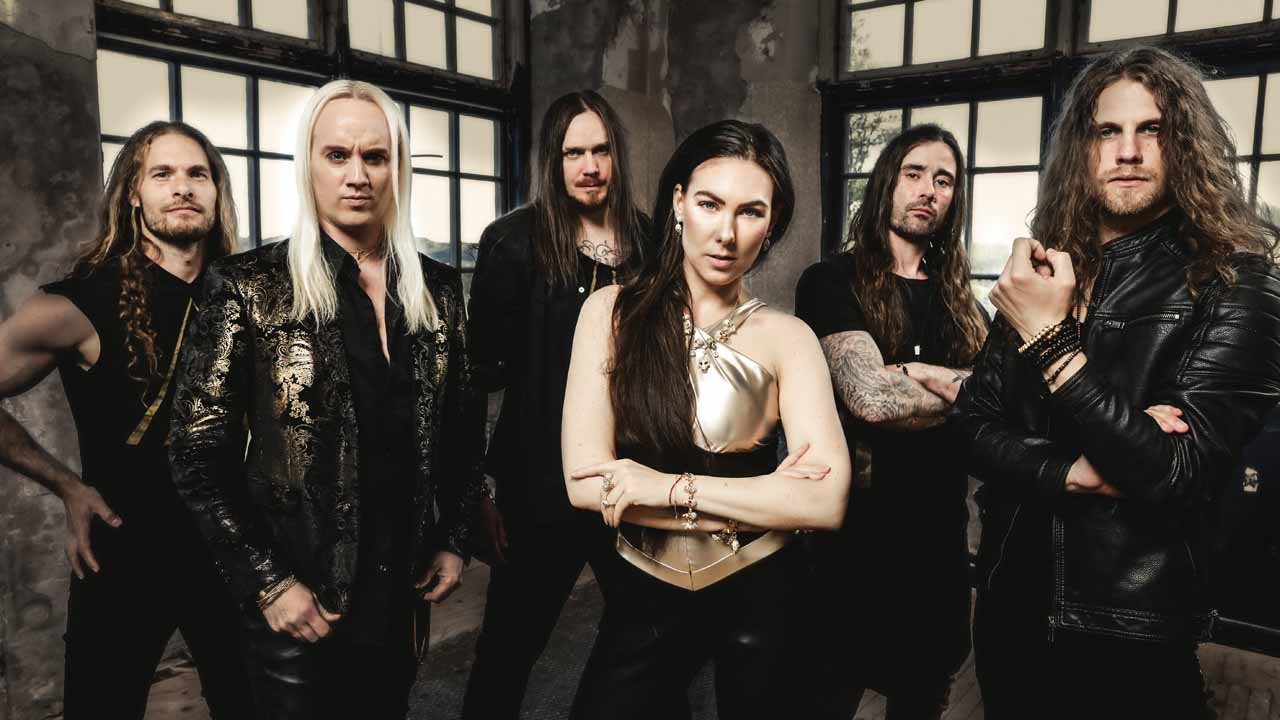Elize Ryd grew up in the Swedish Bible Belt in Värnamo, a small, picturesque town dotted with churches, two hours from Gothenburg, where heavy music was the devil. “To be a metal fan was… well, people had their opinions,” she says today, chatting animatedly down the phone to Metal Hammer as she recalls her journey from Sweden’s conservative centre, to genre-hopping melodic metallers Amaranthe.
Despite the outrage of their neighbours, the Ryd family worshipped fervently at the altar of the riff. Elize’s father was a hard rock lover who played bass, while her mother was a singer/songwriter who listened to punk. Like most kids, Elize lapped up the pop music and Eurodance she heard on the radio, nurturing the tastes that would go on to inform Amaranthe’s dynamic blend of metal, synth pop and euphoric EDM. But it was her older brother and metaller, Johan Carlzon, vocalist in local doom band Abandon, who ‘schooled’ her in metal and alternative rock.
“The first three years of a baby’s life is where you shape that person to what it will become,” she says. “I think I listened to more metal growing up than other kinds of music.”
When Elize was two years old, Metallica’s tourbus skidded off the road, killing bassist Cliff Burton, just a 20-minute drive from her house. Although she was too young to remember the accident, she can recall the impact it had on Johan, who was a massive Metallica fan. From then onwards, he was determined to impress on her the importance of Cliff and the music he had stood for, buying Elize her first metal album – The Black Album on cassette – followed by albums by Queen, Kiss and Maiden.
“I’m forever grateful that he introduced me to metal,” Elize says. “I went to his concerts when I was seven or eight years old, sitting on my mother’s shoulders.”
Surrounded by music throughout her childhood, Elize quickly set her sights on becoming a singer. In 2004, she enrolled on a three-year course at Gothenburg’s Performing Arts School and began laying down guest vocals for local power metallers Falconer and Dreamland. But two years later, things really kicked up a notch when she met Amaranthe’s Olof Mörck, then the guitarist in power metal band Dragonland, in a nightclub.
“He knew my brother, everyone knew my brother,” she says. “He was a local celebrity because he was so great at growling. I think he was impressed I was the little sister of this extreme metal growler.”

Olof was just as impressed with Elize’s powerful voice, though. And when he heard Nightwish were seeking a new singer to replace Tarja Turunen, who had been fired from the band in 2005, he secretly sent over the tapes of Elize’s Dragonland and Falconer guest vocals.
“It was the one of the nicest things anyone had ever done for me,” laughs Elize. “I was very shy, I would never have sent in my audition tape. He said, ‘Let’s try and see what happens, and if they don’t like it, we start our own band.” Much to her shock though, the symphonic giants were interested, and responded, asking her to record demo vocals for two tracks, Nemo and I Wish I Had An Angel.
The gig eventually went to Anette Olzon, who fronted Nightwish from 2007-2012, but although Elize was disappointed, she was far from disheartened by the decision. “That lit up a fire inside of me,” she says. “I didn’t sing opera and thought, ‘Maybe I’m not the best for them’, but when they announced Annette as the singer, I got it. They didn’t want an opera singer. They were interested in my voice; that meant my voice might not be so wrong for this.”
Energised, she and Olaf started recording the material that would go on to be Amaranthe’s 2009 EP, Leave Everything Behind, but as they were finishing the songs, Elize was dealt a devastating blow; her brother had passed away after an overdose. He was just 32 years old. “It was unconsciously based around making my brother proud,” Elize says of her decision to pursue a career in metal. “I wanted to carry on the legacy of him. I [felt I] was staying in contact with him through the music.”
Elize and Olof initially posted the early Amaranthe songs to MySpace, attracting the attention of their first record label, Spinefarm, who signed them in 2010 and released their first five albums. The tracks also grabbed the lugs of power metallers Kamelot, who invited Elize to join them on their 2012 US tour as a backing vocalist – supporting Nightwish. “It was a surreal situation,” she says. “I didn’t dare remind them of the audition so I don’t know if they remembered.”
On the evening of September 28 2012, as the tour rolled into Denver, Anette was taken ill and rushed to hospital just a few hours before showtime. With the Ogden Theatre packed with 1,600 expectant fans, Nightwish asked Elize if she would fill in on vocals. “I remembered the songs I recorded for my audition tape, but I wasn’t so sure about the other ones,” she remembers, revealing she was so nervous she asked Alissa White-Gluz, now current Arch Enemy singer, who was also on the tour providing backing vocals for Kamelot, to join her. The singers had just 55 frantic minutes to learn the setlist, and took to the stage with the lyrics written on sheets of paper. “We were thinking the audience would be very disappointed, but they wanted so bad to hear the band play,” she says. “The mood was amazing.”
Since then, although Elize is still most comfortable as part of an ensemble – she’s one third of a vocal trio in Amaranthe, alongside growler Henrik Englund Wilhelmsson and new recruit, Nils Molin – she’s grown in confidence. “We have a superhero theme with the new album [Amaranthe’s sixth album, Manifest] and this is exactly what it means,” she says. “You overcome your fears, you do things you never think you would do, or be able to do.”

Sonically too, Manifest is the band’s most assured effort yet, taking their vivid, yet undoubtedly divisive, pop metal to the next level and turning their gigantic hooks and sparkling choruses up to skyscraper levels. And while the purists can sneer, Elize insists the band are bringing something new to the table.
“I haven’t heard anyone say it’s cheesy,” she argues when we ask how fans have reacted to the overblown nature of their music. “We want to give people an endorphin kick. You cannot take music forward if you try and sound the same as everyone else.”
Over half a decade of slow burn experimentation, Amaranthe have arrived at a sound that would fit as much competing at Eurovision as it would on the Download Fest line-up. This is perhaps unsurprising, given both Elize and Nils have competed in the competition – Elize in 2015, with opera singer Rickard Söderberg, and Nils in 2011, with his band Dynazty. Neither made the live finals, but Elize agrees it’s something Amaranthe would definitely be open to in the future. “People have opinions, [like] you shouldn’t sell yourself to ‘corporate things’, but we are giving people a gift,” she enthuses. “If we did Eurovision, we would give people something great they didn’t even know existed.”

